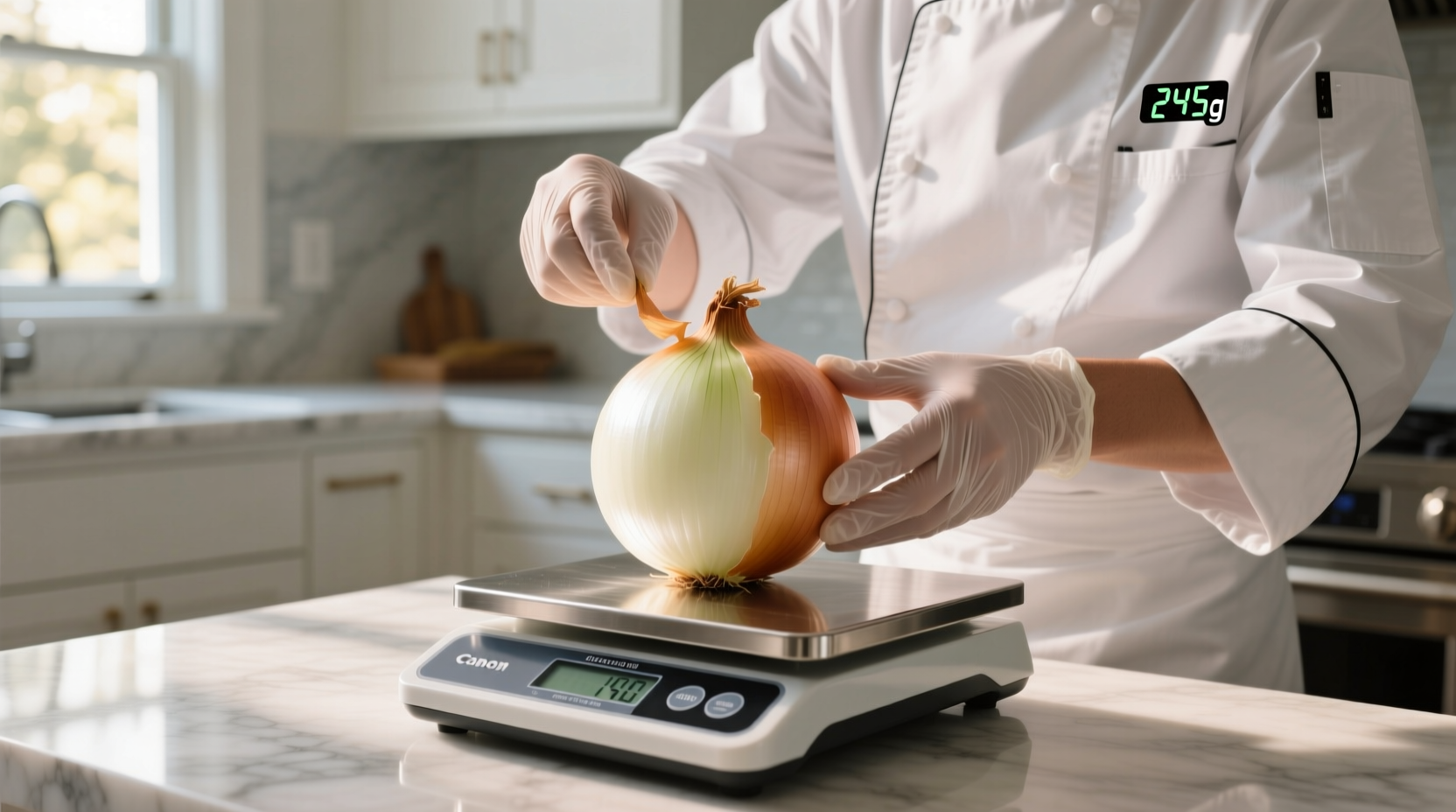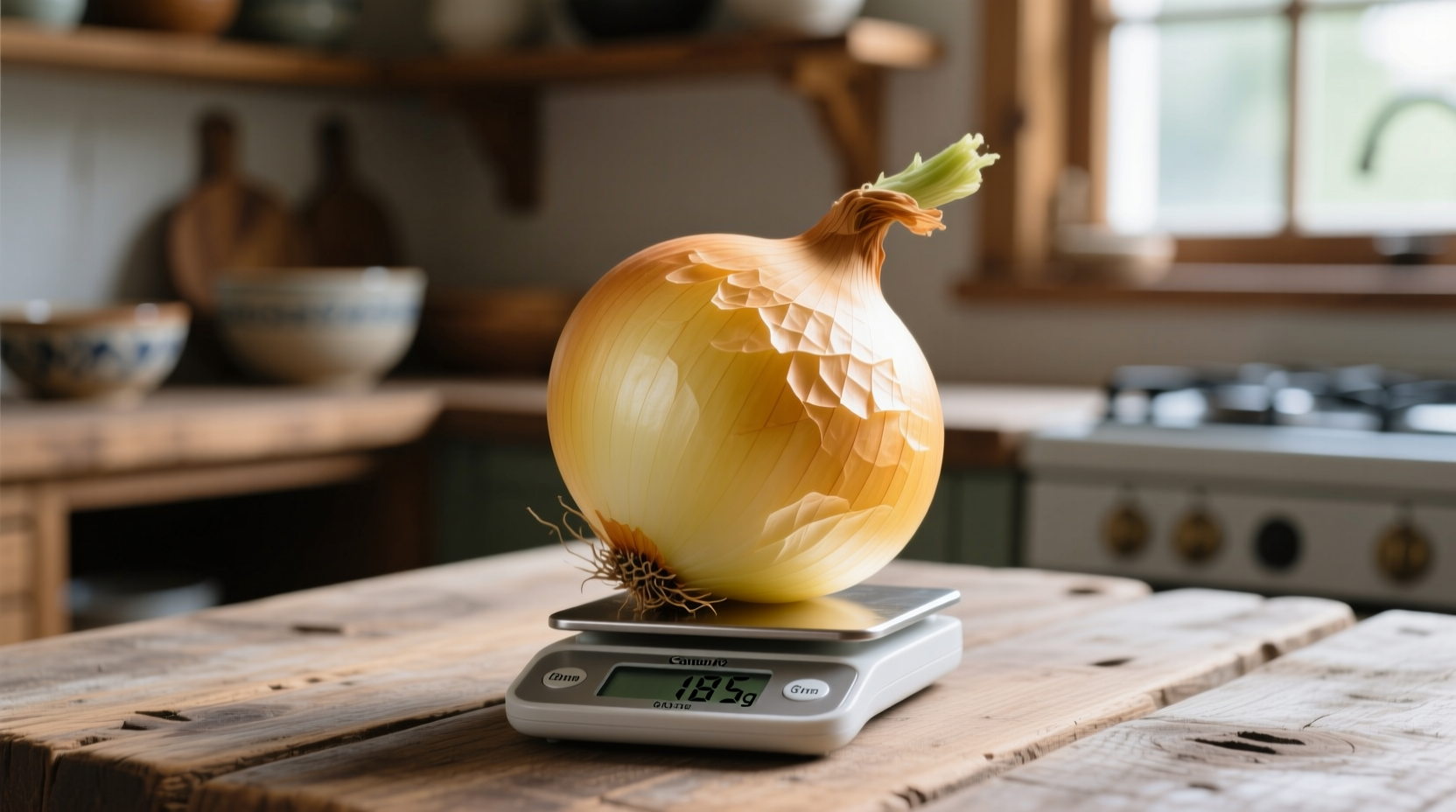Understanding onion weights isn't just kitchen trivia—it's the difference between a perfectly balanced sauce and an overpowering disaster. As a professional chef who's measured thousands of ingredients, I've seen how crucial these measurements are for consistent results in both home and professional kitchens.
Why Onion Weight Matters More Than You Think
When recipes specify "one medium onion," they're making an assumption about weight that directly impacts flavor balance. Onions contain varying water content and sulfur compounds that affect taste intensity. A 50-gram difference can dramatically alter the flavor profile of delicate sauces or baked goods where precision matters.
| Onion Size | Weight (Grams) | Weight (Ounces) | Diameter | Culinary Use |
|---|---|---|---|---|
| Extra Small | 57-85g | 2-3 oz | 2-2.5 inches | Garnishes, pickling |
| Small | 85-113g | 3-4 oz | 2.5-3 inches | Sauces, dressings |
| Medium | 113-170g | 4-6 oz | 3-3.5 inches | Most recipes, roasting |
| Large | 170-227g | 6-8 oz | 3.5-4 inches | Batch cooking, grilling |
| Extra Large | 227g+ | 8 oz+ | 4+ inches | Caramelizing, stuffing |
This sizing standard comes from the USDA National Nutrient Database, which provides consistent measurements for nutritional calculations across foodservice industries. Professional kitchens rely on these standardized weights for recipe costing and consistency.
Measuring Onions Without a Scale: Practical Techniques
When you don't have a kitchen scale handy, these field-tested methods work reliably:
- Diameter method: Measure across the widest part—medium onions are typically 3-3.5 inches in diameter
- Hand comparison: A medium onion fits comfortably in an average adult hand
- Cup measurement: One medium chopped onion yields approximately 1 cup (237ml)
- Visual reference: Comparable to a tennis ball for small, baseball for medium, softball for large

When Precision Becomes Critical
While many savory dishes tolerate some variation, these situations demand accurate onion measurements:
- Baking: In recipes like onion bread or savory muffins where moisture content affects texture
- Canning and preserving: Proper acid-to-vegetable ratios require precise measurements for food safety
- Commercial recipe scaling: A restaurant kitchen converting a home recipe must maintain exact proportions
- Dietary restrictions: For low-FODMAP diets where specific onion quantities trigger symptoms
The National Restaurant Association's culinary standards emphasize that consistent ingredient measurement reduces food waste by 12-15% in professional kitchens. This precision translates directly to home cooking where ingredient costs add up.
Regional Variations in Onion Sizing
Be aware that "medium" means different things globally:
- United States: Follows USDA standards (113-170g)
- United Kingdom: "Medium" often refers to 150-200g onions
- Australia: Uses metric sizing with "medium" at 140g
- European Union: Classifies by diameter rather than weight
When following international recipes, always check the country of origin to adjust measurements appropriately. This knowledge comes from the International Culinary Federation's standardized measurement guidelines used by professional chefs worldwide.
Practical Kitchen Application Guide
Here's how to apply this knowledge immediately:
- Recipe conversion: When a recipe says "2 cups chopped onion," use two medium onions (approximately 226g)
- Batch cooking: For meal prep, remember that 1kg of onions equals roughly 6 medium onions
- Substitutions: If substituting shallots (which are more intense), use half the weight of onions called for
- Storage planning: Buy larger quantities when onions are in season—they store well and you'll know exactly how much you're getting
Mastering these measurements transforms your cooking from hit-or-miss to consistently excellent. The next time a recipe calls for "one onion," you'll know exactly what that means in practical terms.
Frequently Asked Questions
How much does a small onion weigh in grams?
A small onion typically weighs between 85-113 grams (3-4 ounces). This size works best for dressings, sauces, and recipes where you want subtle onion flavor without overpowering other ingredients.
What is the average weight of a large onion?
A large onion weighs approximately 170-227 grams (6-8 ounces) with a diameter of 3.5-4 inches. This size is ideal for roasting, grilling, or when a recipe specifically calls for "large onion" for proper flavor balance.
How many grams is one cup of chopped onion?
One cup of chopped onion weighs approximately 160 grams. This conversion is crucial for recipes that measure by volume rather than count, especially in baking and precise sauce preparations.
Does cooking change an onion's weight?
Yes, cooking significantly reduces an onion's weight due to water loss. A raw medium onion (140g) typically reduces to 90-100g after caramelizing as it loses about 30% of its water content during the cooking process.











 浙公网安备
33010002000092号
浙公网安备
33010002000092号 浙B2-20120091-4
浙B2-20120091-4